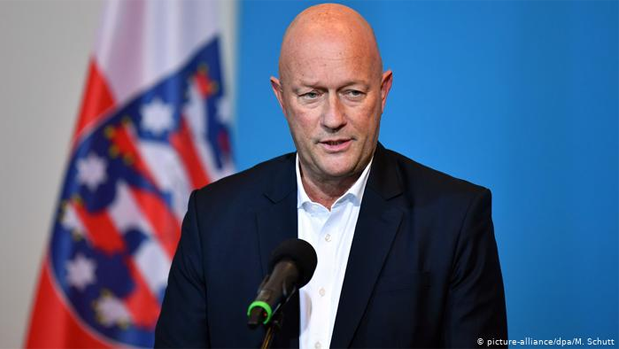
کیا آپ نے کبھی سنا ہے کہ کوئی شخص ایک منتخب عوامی نمائندے کے طور پر صرف ایک دن کام کرے اور اسے اس کا معاوضہ ترانوے ہزار یورو ملے، جو ایک لاکھ دو ہزار امریکی ڈالر کے برابر بنتا ہے؟ ایک جرمن سیاستدان کے ساتھ ایسا ہی ہوا۔
جرمنی کے مشرق میں واقع وفاقی صوبے تھیورنگیا میں بدھ پانچ فروری کو ترقی پسندوں کی فری ڈیموکریٹک پارٹی کے صوبائی سربراہ ٹوماس کَیمیرِش کو نیا ریاستی وزیر اعلیٰ منتخب کیا گیا تھا۔ ان کا انتخاب جرمنی کی داخلی سیاست میں ایک بحران کی وجہ بنا اور اس سیاسی زلزلے کے شدید جھٹکے ملکی دارالحکومت برلن تک محسوس کیے گئے تھے۔
اس بحران کی وجہ یہ بنی کہ کَیمیرِش کے انتخاب کے لیے ان کی اپنی پارٹی کے علاوہ جرمن چانسلر انگیلا میرکل کی قدامت پسند جماعت کے ارکان نے بھی ووٹ دیے تھے۔ لیکن کَیمیرِش کی حمایت میں انتہائی دائیں باز وکی ملک میں مہاجرین کی آمد اور اسلام اور مسلمانوں کی مخالفت کرنے والی جماعت ‘متبادل برائے جرمنی‘ یا اے ایف ڈی کے پارلیمانی ارکان نے بھی حمایت کی تھی۔
چانسلر میرکل کا مطالبہ
یہ بحران اس لیے پیدا ہوا کہ ایک ایسی سیاسی جماعت جس کے ساتھ جرمنی کی قومی سطح کی کوئی بھی بڑی پارٹی کسی بھی قسم کا سیاسی تعاون نہیں کرنا چاہتی، اس کے ارکان کے ووٹ لے کر کَیمیرِش وزیر اعلیٰ کیوں منتخب ہوئے۔ اتنا ہی بڑا اعتراض یہ بھی تھا تھیورنگیا کے نئے وزیر اعلیٰ کے انتخاب کے لیے سیاسی طور پر میرکل کی جماعت اور غیر ملکیوں کی مخالف پارٹی اے ایف ڈی جیسے ‘ہم خیال اور ہم رکاب‘ ہو گئی تھیں۔

ناقدین کا ایک فیصلہ کن اعتراض یہ تھا کہ ترقی پسندوں کی پارٹی سے تعلق رکھنے والے کَیمیرِش نے وزیر اعلیٰ بننے، یعنی اپنے اقتدار میں آنے کے لیے ایک ایسی جماعت کی ارکان کی حمایت پر انحصار کیا، جس کی سیاست کے خلاف تقریباﹰ تمام بڑی جرمن سیاسی جماعتیں جدوجہد کر رہی ہیں۔
یہ بات اتنی پھیل گئی تھی اور کَیمیرِش کے تھیورنگیا کے سربراہ حکومت کے طور پر اس طرح انتخاب کی اتنی شدید مذمت کی جا رہی تھی کہ بدھ پانچ فروری کو ہی چانسلر میرکل نے بھی یہ مطالبہ کر دیا تھا کہ اس الیکشن کو فوری طور پر منسوخ کیا جائے۔
اگلے ہی دن استعفیٰ
پھر نتیجہ یہ نکلا کہ تھیورنگیا کے نئے وزیر اعلیٰ بہت زیادہ سیاسی اور اخلاقی دباؤ کا سامنا نہ کر سکے اور اپنے انتخاب کے صرف ایک روز بعد جمعرات چھ فروری کی شام وہ اپنے عہدے سے مستعفی بھی ہو گئے۔ اس طرح ان کا انتخاب اور پھر استعفیٰ اس حوالے سے بھی جرمنی میں ایک تاریخی واقعہ ثابت ہوا کہ وہ صرف تقریباﹰ 24 گھنٹے تک وزیر اعلیٰ کے عہدے پر فائز رہے تھے۔
لیکن انتظامی اور مالیاتی حوالے سے اس سیاسی بحران اور اس کے فوری خاتمے کا ایک پہلو یہ بھی ہے کہ کَیمیرِش اگر وزیر اعلیٰ رہتے، تو انہیں ان کے فرائض کی انجام دہی کا معاوضہ تو ملنا ہی تھا کیونکہ سیاسی عہدوں پر فائز شخصیات کو تنخواہیں تو ملتی ہی ہیں۔
قانون کیا کہتا ہے؟
ٹوماس کَیمیرِش چاہے ایک دن کے لیے ہی سہی، مگر تھیورنگیا کے وزیر اعلیٰ تو رہے تھے۔ اس بارے میں قانون یہ کہتا ہے کہ اگر وہ چند ہفتے یا چند ماہ کے لیے بھی وزیر اعلیٰ رہتے مگر اس عرصے کا دورانیہ چھ ماہ سے کم ہی ہوتا، تو بھی انہیں اپنے عہدے سے رخصتی پر کم از کم چھ ماہ کی تنخواہ تو لازمی ملتی۔ اب یہ ایک بالکل علیحدہ بات ہے کہ صوبائی سربراہ حکومت کے طور پر ان کے اقتدار کا دورانیہ دو دنوں کے دوران مجموعی طور پر صرف تقریباﹰ 24 گھنٹے رہا تھا۔ اس لیے اب انہیں اتنی تنخواہ ضرور ملے گی، کہ جیسے وہ کم از کم چھ ماہ تک صوبائی حکمران رہے۔
‘فی گھنٹہ چار ہزار یورو‘
چھ ماہ کی تنخواہ کی یہ رقم مجموعی طور پر 93 ہزار یورو بنتی ہے، جو ایک لاکھ دو ہزار امریکی ڈالر کے برابر ہے۔ اس طرح دیکھا جائے تو کَیمیرِش کو محض 24 گھنٹے تک ملازمت کرنے کا معاوضہ 93 ہزار یورو ملے گا، یعنی فی گھنٹہ اجرت تقریباﹰ چار ہزار یورو۔
ایک دن کے کام کی اتنی زیادہ اجرت اس لیے بھی بہت عجیب بات ہے کہ دنیا میں عملی طور پر شاید ہی کوئی دوسرا ایسا سیاستدان ہو، جس کی فی گھنٹہ تنخواہ تقریباﹰ 4000 یورو بنتی ہو۔ جرمن صوبے تھیورنگیا میں وزیر اعلیٰ کی ماہانہ تنخواہ تقریباﹰ 16 ہزار یورو ہوتی ہے۔
Automatic Translated By Google
Have you ever heard that someone works as an elected public representative for just one day and gets paid up to Thousand Euros, which equates to 100,000 US dollars? That’s what happened to a German politician.
On February 5 in the federal province of Thuringia, in the east of Germany, the provincial head of the Free Democratic Party of the Progressives, Tomas Kiemeresh, was elected new state chief minister. Their choice led to a crisis in Germany’s internal politics, and the tremors of this political earthquake were felt throughout the country’s capital, Berlin.
The crisis was caused by the fact that members of the Conservative Party of the German Chancellor Angela Merkel voted for the election of the Kamyrish. But the support of the camaraderie was also supported by the influx of refugees into the far right-wing country, and by the parliamentary members of the German Alternatives for Germany or the AFD, who oppose Islam and Muslims.
Demand for Chancellor Merkel
The crisis arose because the Kamirish chief was elected with the votes of members of a political party with which no major national-level party of Germany wants any kind of political cooperation. An even bigger objection was that politically Merkel’s party and the foreign opposition party, such as the AFD, had been ‘out of consideration and supportive’ for the election of the new Chief Minister of Thuringia.
One of the critics’ decisive objection was that the Kamirish, who belonged to the Progressive Party, relied on the support of members of a party to come to power, which almost all major Germans opposed to politics. Political parties are struggling.
This was so prevalent, and the election of Thyrangiya as head of the Kiemarisch was so strongly condemned that on February 5, Chancellor Merkel also demanded that the election be canceled immediately. To be done
Resignation the next day
Then it concluded that the new Chief Minister of Thuringia could not face too much political and moral pressure, and he resigned on Thursday evening, February 6, just one day after his election. His election and resignation thus proved to be a landmark event in Germany that he held for only about 24 hours.
But one aspect of this political crisis and its immediate elimination in the administrative and financial context is that if the Kamirsch had been the Chief Minister, he would have to be paid for the performance of his duties because the salaries of those in political positions were paid. See you
What does the law say?
Tomas Kamiresh, even if only for a day, remained the Chief Minister of Thuringia. Regarding this, the law says that if he was chief minister for a few weeks or even a few months but the duration was less than six months, he would still have to get at least six months’ salary from his post. Meet It is now a matter of course that his term as provincial head of government lasted only about 24 hours during the two days. Therefore, they will now receive as much salary as if they had been the provincial ruler for at least six months.
‘Four thousand euros per hour’
The six-month salary amount totals 93,000 euros, which is equivalent to US $ 100,000. From that point of view, the camaraderie will be paid 93,000 euros for just 24 hours of work, ie about four thousand euros per hour.
So strange that the wages of such a day’s work are so strange that there is practically no other politician in the world who earns about 4000 euros per hour. In the German province of Thuringia, the chief minister’s monthly salary is about 16 thousand euros.





























































